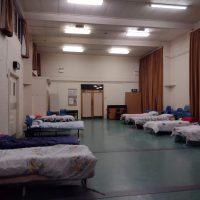Sermon given 26 Jan 2025 by the Revd Maggie Hindley
Readings: Psalm 19; Luke 4: 14-21; 1 Corinthians12: 12-31(a)
I am because you are. Ubuntu. An ancient African idea, brought to the attention of the world by Archbishop Desmond Tutu as he presided over South Africa’s Truth and Reconciliation Commission after apartheid there ended.
Ubuntu. An orphaned rhino calf, with much to offer to the shared life of the African bush; his species threatened by the greed of poachers and brought almost to extinction; saved by the care of children, who in turn are supported by the care of understanding adults. He is because they are. We are because he is, an important part of the family of living beings.
Ubuntu is an idea that kept returning to my mind as I thought about this week’s readings, each of which, with completely different emphasis, seemed to point to the truth that we are irrevocably bound together.
Creation itself communicates that. Psalm 19 shows nature as our teacher, speaking to us, singing to us, without the need for words, reminding us powerfully and repeatedly that we are childen of a great creator, whose laws are as beautiful and as natural as creation itself. Only we forget; we need to be reminded of the ways in which we are blotting out the truth by our obsession with self, and to return to an awed humility. Clear me from hidden faults. We need to keep re-learning that I am because you are.
Paul communicates it very explicitly as he talks, in this famous passage from Corinthians, about church life. We are all one body; what’s good for one part is good for all. If one part suffers we all suffer. Every part has a function; every part is worthy of equal respect and regard; none is to be despised. We are all different, but all one.
And Jesus teaches how this plays out in the Kingdom. Those who suffer – those who are very poor, prisoners and hostages, people with disabilities, people who are being victimised and exploited – in the Kingdom all of these are set free to live creatively and purposefully; all of us live in peace and prosperity.
I generally have trouble with the concept of the Trinity (I tend to find it a bit static) but I am excited to see how it works in today’s gospel. The Father has anointed and sent Jesus; the Spirit motivates and guides him and here He is, launching his ministry. The Father can’t do anything alone, nor can the Spirit, nor can Jesus, but together they are everything. I am, because you are, each person of the community which is God seems to be saying. Ubuntu is in God’s DNA. It’s also in ours.
I’d got that far in my thinking when Bishop Mariann Edgar Budde’s Inauguration Day sermon went viral. You saw that? Maybe I should just stop here and play it to you. Dr Edgar Budde’s call to look more deeply at what is meant by the much promised national unity is also a biblical call to Ubuntu. Ubuntu, true unity, in the biblical sense, means inclusiveness – of those of non mainstream gender and sexuality, and also of undocumented migrants who serve the economy or are fleeing intense oppression. True unity is underpinned by honouring the truth, and by a spirit of compassion, and by humility. (Micah’s Do justice, love kindness, and walk humbly with God). And by the mercy for which she appealed to the president-to-be. That says it all, I think. Except that true unity, ubuntu, needs what the bishop showed us by what she did – by unflinching courage, speaking truth to power in a very literal, not to mention risky, way. Indeed, she’s written a book called How we learn to be brave. I ordered a copy quickly in the expectation that there would be a rush of demand for it.
Don’t we need this Ubuntu, this unity in our world today? More than ever in the whole of my lifetime, I believe. I guess that, like me, you long for an end to the wars in the Middle East, in Ukraine, in Sudan; an end to the killings and the oppression so that there is room for something like the Truth and Reconcilation Commission, or whatever it is that is going to bring healing and forgiveness and an end to deep seated enmities.
What’s our own role in making Ubuntu happen? It begins with out inner work, since we don’t have the innocent clear-sightedness of a Thembile or a George; since, like the psalmist, we are prone to error and to coming under the undue influence of ‘the insolent’ – the powerful egoists who run the world. We need to consciously work on the empathy that brings us to recognise our one-ness with each other.
So, we can do what the psalmist does; marvel at the nature – the sun, and the night sky – under whose beneficence we all live; we can ponder God’s teachings; we can offer ourselves up to God so that our unconscious delusions may be dissolved as we come to understand how we are one with all creation in its beauty and diversity.
We can do what Paul recommends (one I find very hard; I don’t know about you) and learn to value the communities we belong to; our family, and above all the church; to appreciate the gifts of others; to value those who may seem to have less to offer; to say no to competitiveness; to accept that we are imperfect people living among imperfect people – and that it’s exactly as such that God works with us. No heroics. Just service of and with each other.
And we can live Ubuntu, live unity, live connection as we face outwards to our poor divided, conflicted, world with its burden of cruelty and hate. What are we doing to set prisoners free? To end poverty? To heal disability and where that not possible to honour it? To accept difference? To promote forgiveness? To show that, though there isn’t room in this world for our greed, there’s enough for our needs, if we redistribute stuff. To protect life on earth – human, animal, plant? To contradict the untruthful and hateful things the powerful are promoting, dangerously, in many places. To live a life that goes against the grain, currently, but that honours truth and is kind and looks to God for strength and guidance.
None of us is an island. No community is truly separate from others even if, as we are here in mainland Britain, it is surrounded by the sea. Ubuntu is in our DNA. Can we, by the way we pray and think and speak and act, let it seep into our bones until it begins to visibly characterise our lives and our personalities, our relationships, our work and ultimately the world we belong to and are called to serve? That would add up to a life worth living!







